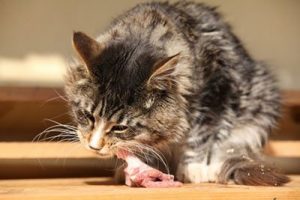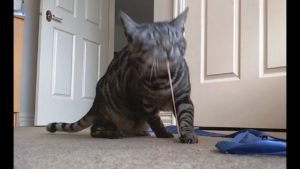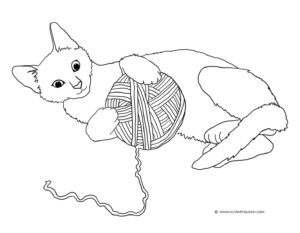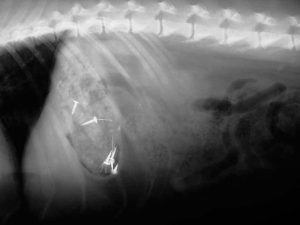Uh-Oh! When Felines Ingest Foreign Objects

Everyone is familiar with the old adage “Curiosity killed the cat.”
But as conscientious cat owners, paw-lease ensure that your cherished companions’ natural curiosity NEVER gets the better of them – especially when it comes to their seeing and then swallowing small, strange objects. While some may pass through their intestinal tract without incident, some won’t, lodging there and causing not only extreme discomfort but a dangerous and potentially life-threatening obstruction.
Thread threat! Another potentially life-threatening situation can occur when a cat swallows thread, particularly when it’s attached to a needle. As she swallows the thread, it can wrap around her tongue and pull against it with every swallow. But even worse, the needle can pierce her stomach or intestines multiple times and prevent the thread from passing through her digestive tract.
Consider, as well, these other culprits:
Hair bands and rubber bands, ribbon and blind cords, dental floss and carpet fibers, stuffing from inside your cat’s toys, and tinsel.
Bones, particularly from cooked chicken, can be very sharp, extremely brittle, and lodge in your kitty’s intestines resulting in severe illness.
String and string-like objects: If swallowed, string can cause the intestines to bunch up, making for one very sick kitty and usually requiring surgery to remove it.
Coins, buttons and earplugs, fruit stones, nutshells and bottle tops, but especially small round objects which are the ideal size to block the intestines and require surgery to remove them.
If YOU suspect that YOUR kitty has swallowed something suspicious, watch for one or more of these symptoms: vomiting, diarrhea, lack of appetite, straining to defecate, constipation, lethargy and behavioral changes such as biting or hissing when being picked up. To err on the side of caution, promptly contact your vet and bring in your kitty for a thorough examination and assessment.
In order to detect a possible blockage, your vet will have x-rays taken (several x-rays, using dyes, will often be needed to locate a suspected object). Your vet may also order blood and urine tests to determine whether your cat’s overall health has been compromised by the obstruction – should there be one.
Most of the time — especially in uncomplicated cases — the prognosis for cats with a gastrointestinal blockage is very good. But the overall prognosis depends on several factors: the location of the object, how long the intestine has been blocked, the size, shape, and characteristics of the object, whether or not the object has caused a secondary illness and the general health of your kitty prior to ingesting it.
Your vet will provide you with a detailed treatment plan based on these factors. If the object has lodged in your pet’s stomach, however, an endoscopy may be performed. This involves inserting a long tube through her mouth and down her throat to pull the object out. If this is the case, your vet may also suggest hospitalization of your cat for close observation and follow-up x-rays.
But if the foreign object has traveled to and is trapped in her intestine, your vet will have to surgically remove it.
Whatever the scenario, time is critical because stomach and/or intestinal blockages can cut off the blood supply to these organs, causing the tissue to become necrotic or “die.”



